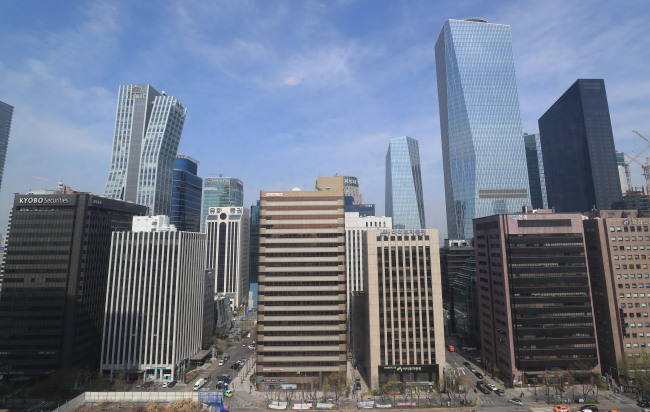The slowing Korean economy has been shadowed by the possibility of a steep asset devaluation, which could push it deep into a long-term recession.
With investment declining and employment worsening, a simultaneous fall in stock and real estate prices could see the country go through something similar to Japan’s “two lost decades” spanning the 1990s and 2000s, economists here warn.
They call for pre-emptive measures to prevent continued asset devaluation from further dampening economic activity.
“It is necessary to examine whether regulations imposed so far on housing and financial markets have been excessive, and if there is room to be eased,” said Kim Hyun-wook, an economist at the Korea Development Institute, a state-run think tank.
 |
Headquarters of brokerage houses in Yeouido, Seoul. (Yonhap) |
Home prices in Seoul have remained flat for seven weeks since the government announced a set of measures to curb soaring house prices in the capital. Apartment prices in posh districts of southern Seoul took a downturn late last month.
In provincial cities, house prices fell more than 3 percent in the first 10 months of this year, according to data from the Korea Appraisal Board. The decrease was close to 10 percent in industrial cities along the southeastern coast, where shipbuilders laid off massive numbers of workers to cope with worsening managerial conditions.
The number of home transactions around the country decreased 12.7 percent from a year earlier to 643,168 in the first nine months of the year.
Experts say the downward trend in house prices should be watched closely as signaling a considerable loss of household assets. According to data from the Bank of Korea, real estate accounts for nearly 75 percent of net assets held by all households in the country.
Last week, Korea’s stock market sank to its lowest level in a year and 10 months before bouncing back on expectations that the prolonged trade war between the US and China might be eased in the coming weeks. In October, the benchmark Kospi fell 13 percent, the steepest monthly decline since October 2008 when it plummeted 23.1 percent.
Analysts say local bourses are expected to remain weak for a considerable period of time as the effect of a possible easing of the US-Sino trade dispute is likely to be offset by concerns over interest rate hikes, worsening corporate profitability and overall economic slowdown.
Lee Jong-woo, a researcher at IBK Investment and Securities, said asset prices had risen to an “abnormal level” on the back of low interest rates over the past years, warning the bubble might be about to burst.
The BOK has kept its key rate at 1.5 percent since November last year, when it raised the rate by 0.25 percentage point from a record-low 1.25 percent. The central bank has suggested an additional quarter-point hike could come this month to rein in excessive liquidity and reduce the widening rate gap with the US.
A rate increase would further weigh on housing and stock markets, having a negative effect on consumption, which has remained sluggish in recent months. On-year growth in private spending decelerated from 3.5 percent in the first quarter to 2.8 percent in the second quarter and 2.6 percent in the quarter that ended Sept. 30, according to BOK data.
A continued slump in consumption would get companies to reduce investments and cut payrolls, dragging on economic growth.
Economists note policy efforts need to be stepped up to ease concerns that asset prices will continue to fall. It is necessary to take specific measures to help bolster stock and property markets, they say.
“The environment surrounding corporate activity should be improved to help investors have confidence that the profitability of local companies will increase over the long term,” said Sung Tae-yoon, an economics professor at Yonsei University. He called for policy changes to curb a rise in labor costs, which he said has aggravated corporate conditions most severely.
Experts say measures need to be taken to bolster sluggish property markets in regional areas. Tighter regulations on housing markets around the country and a reduction in government spending on infrastructure resulted in construction investment shrinking 6.4 percent on-quarter in the July-September period this year.
There are concerns that a steep decrease in asset prices will increase nonperforming loans and create a credit crunch, destabilizing the financial system.
Many heavily indebted households are on the brink of defaulting on their debts. The ratio of household debt to disposable income rose from 133.9 percent in 2013 to 159.8 percent in 2017. The figure stood at 161.1 percent in the first half of 2018.
Experts say the central bank may need to refrain from raising rates this month to avoid accelerating asset devaluation amid a deepening economic slump.
Cho Young-moo, a researcher at LG Economic Research Institute, said the extent of a fall in asset prices might not be important in itself, if an economy could endure the impacts from devaluation, adding the country’s economic health is too weak to absorb them.










